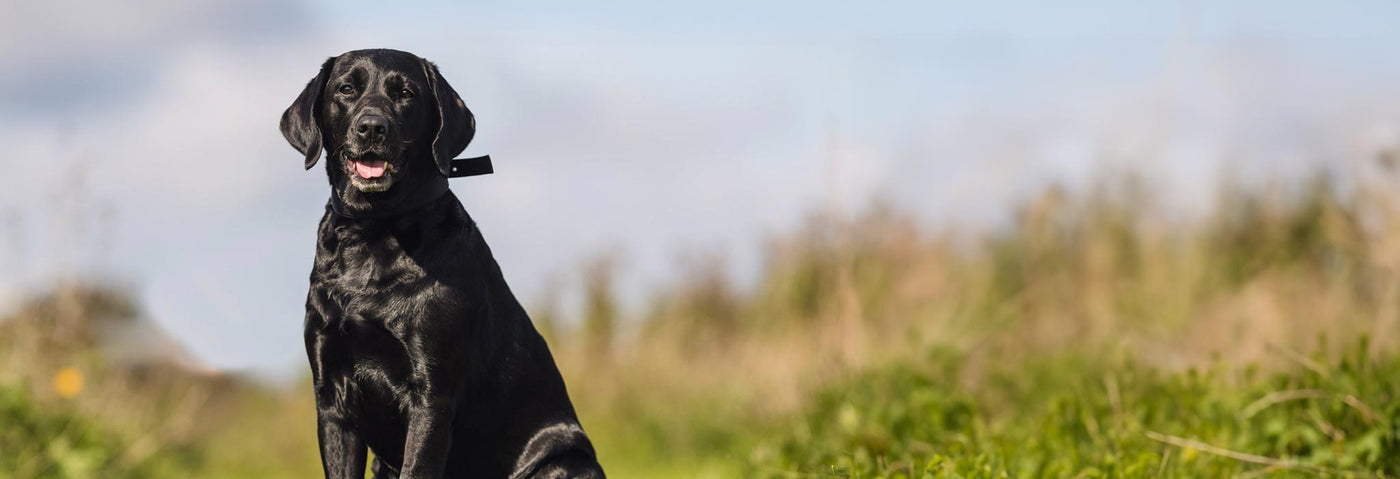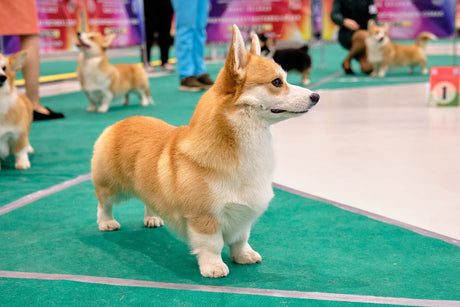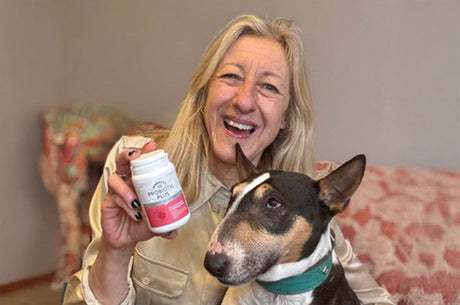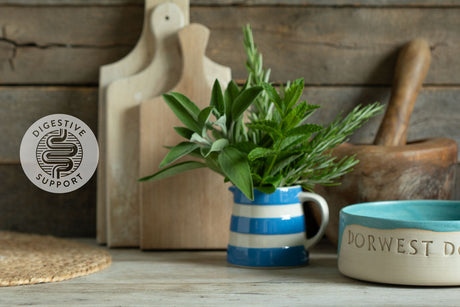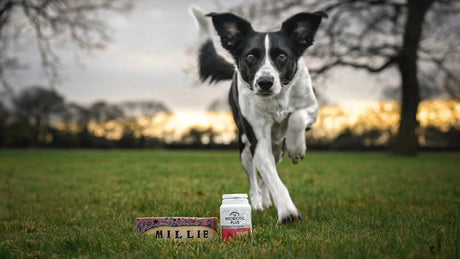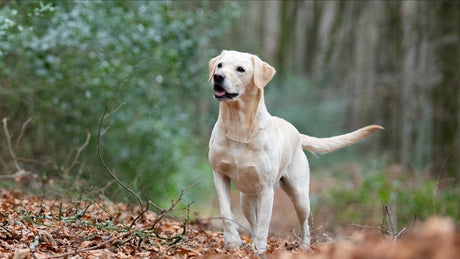When you're at your local veterinary surgery, it's likely you'll hear the words "pop your dog on the scales." For many, this is just part of the process. Others reading this may have experienced a slightly different feeling! A dreaded feeling in the pit of your stomach might lurch up, as deep down you know..."I have an overweight dog." It happens to the best of us. This doesn't make you a bad pet parent but failing to change these habits can lead to poor consequences for our dogs. The great news is, you can do something about it! Fantastic!! Here we share our top tips to transform your overweight dog into a happier, healthier pet…
HOW TO RECOGNISE IF YOUR DOG IS OVERWEIGHT
As we see our dogs everyday, sometimes it can be harder to recognise if they’re overweight, as their weight may have gradually increased. So how do you know if your dog is overweight?
- WEIGH-IN: Knowing what your dog should weigh compared to what they do weigh is obviously the clearest way of understanding your dog’s weight. Don’t be scared of the scales, embrace them!
- RIBS & HIPS: Ideally these should be just visible (for example, not protruding but certainly not covered in a dense layer of fat either).
- WAIST: When looking at your dog from above, does he/she have a waist? If not, it's time to make a change!
- SAGGY TUMMY: As with us humans, if your dog's tummy has started to become a little rotund and saggy when looking at them from one side, it's a clear sign it's time to change to a healthier diet and more exercise.
- FAT AROUND BASE OF NECK & TAIL: If there is a clear build up of fat around these areas, this is another sign it's time to make a change to your dogs diet and lifestyle.
- SUBTLE SIGNS: Sometimes it's not only how your dog physically looks but also how they behave. If your dog is lacklustre towards exercise and/or is excessively panting, these can be signs of an overweight dog.
COMMON PITFALLS LEADING TO AN OVERWEIGHT DOG (& HOW YOU CAN CHANGE THIS!)
According to the PDSA, vets estimate nearly half of dogs in the UK are overweight! So how does this happen? In short, we find it hard to say 'no' to our dogs. So many of our dogs have us wrapped around their paws (whether we want to admit this or not!) With those puppy dog eyes, it's easy to see why. Here are some of the common pitfalls that befall us pet parents, which lead us to creating an overweight dog. Awareness of these potential pitfalls can help you maintain a healthy weight for your dog…
OVERFEEDING: One of the main pitfalls relates to the fact many of us are giving our dogs too much breakfast and dinner. Being clear exactly what your dog needs for their size and body weight is really important. If you're unsure, don't worry! There are plenty of people to ask, such as your vet or the supplier of your dog food. Being informed makes all the difference. You can feel comforted they're getting enough, so they feel full and happy, but not too much which may cause problems for them along the line. Like some humans, many dogs don't have an 'off' switch when it comes to food. Some would just eat and eat if they could. It's therefore really important we take control of this if we want to ensure our dog lives a long and healthy life.
GIVING TREATS ALL THE TIME: Oh we do like to treat our dogs - of course! Sometimes it's really important to do so to reward their behaviour. However, if you're giving treats to your dog throughout the day, with no real reason to do so, you may actually be putting your dog are more risk of becoming overweight. The weight can sneak up and pile on really subtly, without you really noticing. If you want to reward your dog, do so at specific times relating to their behaviour, rather than all the time.
FEEDING FOOD FROM YOUR PLATE: Some dogs can't resist the aroma of our human food, especially if we sometimes give them our leftovers from the table. It's easy to see why some of us do this, when they use their best pleading face or pop a paw on your lap to ask for some food from your plate. It can be really hard to resist at times. But you should. Some of our food simply isn't designed for dogs. It can contain hidden ingredients which really can't be digested properly by dogs. It also leaves you at high risk of finding the results of an upset tummy on your dining room floor! In some cases it can even make them very ill if you unwittingly feed them something which is toxic for their bodies.
It can also be very confusing for your dog if you sometimes feed from your plate and sometimes you don't. Maintaining a clear rule can be really helpful for your dog. It can also help you from being tempted to give them leftovers!
NOT ENOUGH EXERCISE: Particularly during the autumn and winter months, many dogs don't receive as much exercise as they should. If the amount of food they're eating doesn't reflect this reduction in exercise, a potential problem arises:
Limited exercise plus the same amount of food = all the hallmarks for creating an overweight dog.
It's the same for us, if we stopped exercising but kept eating large portions, our weight would increase too. Making sure your dog receives plenty of exercise is so important and is one of the best ways of maintaining a healthy weight for your dog.

POTENTIAL PROBLEMS FOR AN OVERWEIGHT DOG
So your dog has a slightly larger waist and a fuller tummy. Is it really that bad?! In short, YES! Here are just some of the reasons you want to avoid your dog from becoming overweight:
- Excessive pressure on their heart & lungs
- Can lead to difficulty breathing, especially for dogs with flat faces
- Puts pressure on joints, bones and backs, increasing the risk of ailments such as arthritis
- Make your dog feel sluggish and excessively sleepy
- Most of all, you're potentially limiting the amount of time your dog will be with you as obesity can lead to a shorter lifespan.
KEEPING YOUR DOG AT A HEALTHY WEIGHT
You obviously don't want any of the above to happen. To help prevent your dog becoming overweight, remember these key points:
- Feed the correct amount of food for the size and breed of your dog
- Give treats only when really deserved (& try to ensure any treats are as healthy as possible)
- Try to refrain from feeding leftovers from your own plate
- Make sure your dog receives lots of varied exercise, which helps keeps the weight off as well as moving all those joints.
- If you're struggling maintaining your dogs weight, get extra help (and don't think you're alone!) Many vet practices offer weight clinics and can even devise a specific plan to get your dog to where they should be.
- If you're unsure what weight your dog should be for their size and breed, just ask! Once you become clearer on what their weight should be and how they should look, you're more likely to make sure you maintain the weight for your dog.
HELLO HAPPY, HEALTHY DOG!
Remember, even if your dog is overweight right now, don't panic. There's lots you can do to change it if you follow the tips listed above. Your dog might not be too happy about it in the short term, but in the long term, they'll be very grateful. You will too - maintaining a healthy weight for the size and breed of your dog gives you the best chance of keeping him or her with you for as long as possible.
Find out more about Dorwest Herbs and our herbal remedies for dogs to improve their general health. If you have any questions about your dog’s diet, one of our experienced advisors would be happy to help. Please get in touch on 01308 897272 or use our contact form. Plus, get free UK delivery on orders over £50.
Please remember, you should always consult a vet if you are concerned about your pet’s health.
